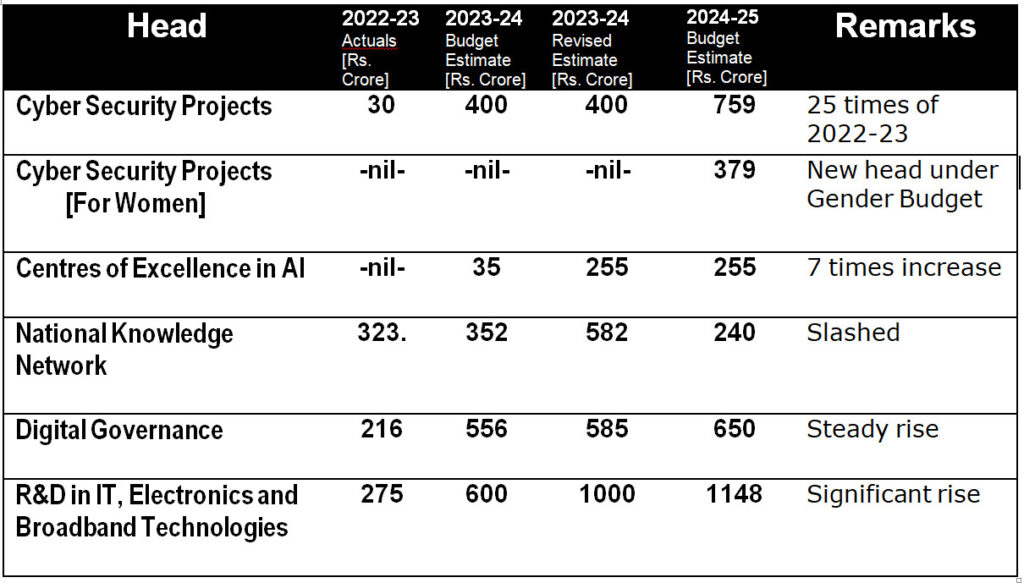In a move of far-reaching impact, the Government in its Budget 2024 has made an allocation of Rs 379 Crore for women in cybersecurity, keeping its promise of enabling participation of more women in the information technology sector.
This game-changing allocation is also expected to fill the critical talent gap in cybersecurity in a country that undergoing fast digital adoption at a scale unprecedented and unwitnessed anywhere in the world.
The allocation Rs 379 crore in Budget 2024 to women is one-third of the total outlay of Rs 1138 crore for cybersecurity, one of the fastest growing segments in the technology domain. The move also aligns with government’s promise to ensure one-third reservation of women in the professional sectors.

Despite serious apprehensions expressed on resurgence of artificial intelligence (AI) in its Economic Survey, the Government has not lost sight of the benefits and has allocated Rs. 255 crore to the Centres of Excellence in AI, seven times of the earlier allocation.
This quantum leap in allocation – from Rs 35 crore to Rs 255 crore – shows government wants to remain firm in the driving seat and lead from the front in the sector that generating threats as fast as applications.
Though Gender Budget was mooted in 2006, the big-time announcement has come only when India had Nirmala Sitharaman as woman finance minister.
“Increasing the participation of women in cybersecurity is not only a matter of diversity but also a strategic imperative to harness a broader range of talents and perspectives,” notes the Economic Survey that underscores the strategic importance of gender which reflected in liberal allocation in the Budget 2024 unveiled next day.
“Addressing the cybersecurity talent gap through targeted upskilling initiatives is vital for preparing a workforce capable of tackling future cyber threats,” it says.
The 524-page Survey stresses an holistic approach to cybersecurity in India and points to the need for continuous innovation, collaboration, and inclusivity.
A significant part has been devoted to emerging technologies such as cybersecurity, fintech, artificial intelligence, quantum computing, CERT, and and the game-changing semiconductor chips fabrication.
Cybersecurity for securing world’s largest and rabidly growing digital infrastructure and impact of artificial intelligence at the centrestage of Government’s concerns. Safeguarding sensitive data against cyber threats is crucial.
The Survey emphasizes that the cybersecurity framework must evolve in tandem with technological advancements to protect consumer data and digital boundaries. Its analysis spotlights a rapidly changing cyber threat landscape, driven by increasing sophistication of cybercriminal tactics and rising cyberattacks.
The need of the hour is a dynamic cybersecurity strategy that adapts to new threats as they emerge. The government recognizes the necessity of robust cybersecurity measures to ensure the safe adoption of digital technologies across sectors. This calls for fostering a culture of cybersecurity awareness among users.
Economic Survey notes the role of artificial intelligence in cybersecurity is of double-edged sword. While AI can enhance security measures by providing advanced threat detection and response capabilities, it also poses new challenges that need to be addressed through innovative solutions and policy frameworks. “Artificial Intelligence offers both unprecedented opportunities and significant challenges in cybersecurity, necessitating innovative solutions and strategic policy interventions.”
India’s Digital Public Infrastructure (DPI), including Aadhaar, UPI, and DigiLocker, has significantly contributed to the nation’s digital transformation. However, securing this infrastructure against cyber threats remains a critical priority, requiring continuous upgrades and security enhancements.
The fintech sector, a key driver of India’s digital economy, faces unique cybersecurity challenges due to its reliance on digital transactions and data. Strengthening cybersecurity in fintech is must to maintain users trust and stability in fintech processes.
Showing the way forward, the Economic Survey recommends enhancing existing cybersecurity frameworks to make them more resilient and adaptive to new threats. This includes regular updates to cybersecurity policies and continuous monitoring of digital infrastructure for vulnerabilities.
Encouraging R&D in cybersecurity technologies as key to staying ahead of cyber threats, it calls for an increased collaboration between public and private sectors to foster innovation and develop cutting-edge security solutions. This includes sharing threat intelligence and best practices to improve the overall security posture and staying ahead of the curve.
Talent gap in the cybersecurity talent gap has been flagged as a priority. Initiatives like ‘Future Skills PRIME’ to upskill the workforce in AI, ML, and cybersecurity are vital for preparing the next generation of cybersecurity professionals.
Increasing the participation of women in the cybersecurity workforce has been underscored by the Economic Survey. This can be achieved through targeted training programs and policies that promote gender diversity in tech fields.
In the financial sector, the integration of AI in financial services has led to significant advancements in fraud detection and risk management. However, ensuring the security of AI systems is paramount to prevent misuse and ensure data integrity.
Protecting patient data from cyber threats is a major concern in the healthcare sector with the increasing digitization of health records. The government advocates for stricter data protection regulations and enhanced security measures in healthcare IT systems.
Safegaurding privacy of students as online learning platforms proliferate has also been noted as crucial by the Economic Survey. It calls for implementing robust cybersecurity policies in educational institutions to address these challenges.
The adoption of Industry 4.0 technologies has transformed manufacturing, but it also exposes the same to cyber risks. Advanced security protocols are needed to protect industrial control systems and intellectual property.
Globally, India has established itself as a leader in various channels of cybersecurity and fintech. The country’s digital public infrastructure (DPI), like Aadhaar, UPI, and DigiLocker stands out as a major strengths in providing secure and efficient digital transactions and services contributing to financial inclusion and transparency.
However, the regulatory framework in India calls for a lot of upgrades to address emerging cybersecurity threats. In comparison, Europe and the US have more mature frameworks for data protection and privacy. They are also better placed to protect citizens digital health and personal records.
Stepped up allocations in cybersecurity and allied sectors, and for women especially, in this Budget will go a long way addressing these issues including a huge talent gap, where less populated countries are not so lucky.



